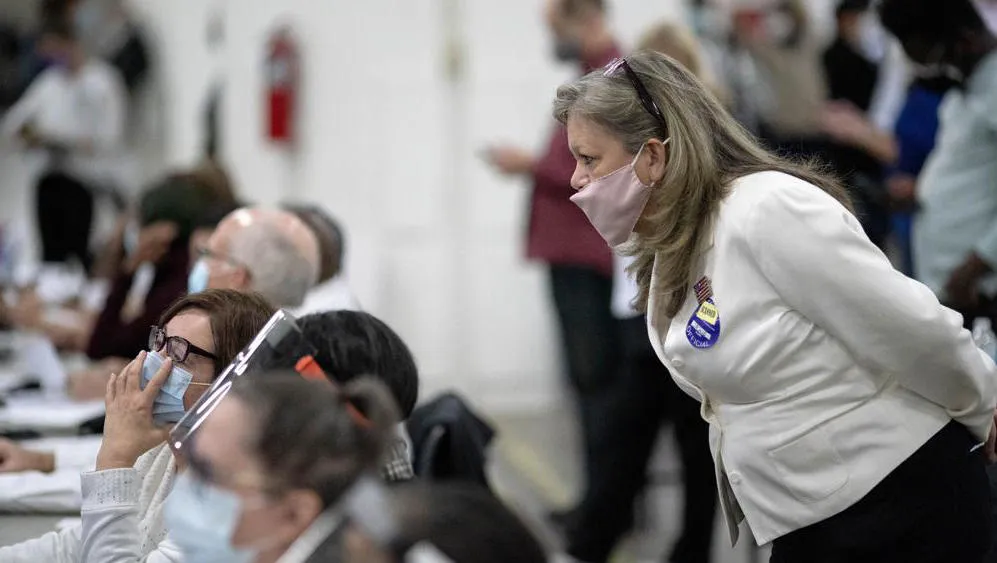An Associated Press review of every potential case of voter fraud in the six battleground states disputed by former President Donald Trump has found fewer than 475 — a number that would have made no difference in the 2020 presidential election.
Democrat Joe Biden won Arizona, Georgia, Michigan, Nevada, Pennsylvania and Wisconsin and their 79 Electoral College votes by a combined 311,257 votes out of 25.5 million ballots cast for president. The disputed ballots represent just 0.15% of his victory margin in those states.
The cases could not throw the outcome into question even if all the potentially fraudulent votes were for Biden, which they were not, and even if those ballots were actually counted, which in most cases they were not.
The review also showed no collusion intended to rig the voting. Virtually every case was based on an individual acting alone to cast additional ballots.
The findings build on a mountain of other evidence that the election wasn’t rigged, including verification of the results by Republican governors.
The AP review, a process that took months and encompassed more than 300 local election offices, is one the most comprehensive examinations of suspected voter fraud in last year’s presidential election. It relies on information collected at the local level, where officials must reconcile their ballots and account for discrepancies, and includes a handful of separate cases cited by secretaries of state and state attorneys general.
Contacted for comment, Trump repeated a litany of unfounded claims of fraud he had made previously, but offered no new evidence that specifically contradicted the AP’s reporting. He said a soon-to-come report from a source he would not disclose would support his case, and insisted increased mail voting alone had opened the door to cheating that involved “hundreds of thousands of votes.”
“I just don’t think you should make a fool out of yourself by saying 400 votes,” he said.
These are some of the culprits in the “massive election fraud” Trump falsely says deprived him of a second term:
- A Wisconsin man who mistakenly thought he could vote while on parole.
- A woman in Arizona suspected of sending in a ballot for her dead mother.
- A Pennsylvania man who went twice to the polls, voting once on his own behalf and once for his son.
The cases were isolated. There was no widespread, coordinated deceit.
The cases also underscore that suspected fraud is both generally detected and exceptionally rare.
“Voter fraud is virtually non-existent,” said George Christenson, election clerk for Milwaukee County in Wisconsin, where five people statewide have been charged with fraud out of nearly 3.3 million ballots cast for president. “I would have to venture a guess that’s about the same odds as getting hit by lightning.”
Even in the state with the highest number of potential fraud cases — Arizona, with 198 — they comprised less than 2% of the margin by which Biden won.
Trump has continued to insist that the election was fraudulent by citing a wide range of complaints, many of them involving the expansion of mail voting because of the pandemic. As the Republican weighs another run for president in 2024, he has waded into some GOP primary contests, bestowing endorsements on those who mimic his “Stop the steal” rhetoric and seeking to exact revenge on some who have opposed his efforts to overturn the results.
Trump’s false claims of a stolen election fueled the deadly Jan. 6 attempted insurrection at the Capitol, have led to death threats against election officials and have become deeply ingrained within the GOP, with two-thirds of Republicans believing Biden’s election is illegitimate. Republican lawmakers in several states have used the false claims as justification to conduct costly and time-consuming partisan election reviews, done at Trump’s urging, and add new restrictions for voting.
The number of cases identified so far by local elections officials and forwarded to prosecutors, local law enforcement or secretaries of state for further review undercuts Trump’s claim. Election officials also say that in most cases, the additional ballots were never counted because workers did their jobs and pulled them for inspection before they were added to the tally.
“There is a very specific reason why we don’t see many instances of fraud, and that is because the system is designed to catch it, to flag it, and then hold those people accountable,” said Amber McReynolds, a former director of elections in Denver and the founding CEO of the National Vote at Home Institute, which promotes mail voting.
The AP’s review of cases in the six battleground states found no evidence to support Trump’s various claims, which have included unsupported allegations that more votes were tallied than there are registered voters and that thousands of mail-in ballots were cast by people who are not on voter rolls. Dozens of state and federal courts have rejected the claims.
--30--
Written by Christina Cassidy. Cross-posted with permission from the Associated Press.







